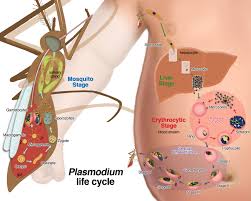Malaria’s Profound effect: A historic angle
Table of Contents
1. Creation
2. The Origins and Early records of Malaria
3. Malaria in historical Civilizations
4. The impact of Malaria on international conflicts
5. Medical Discoveries and Breakthroughs
6. The economic and social consequences of Malaria
7. .Malaria in the current era
8. Techniques for Malaria Eradication
9. The destiny of Malaria Prevention and treatment
10. Conclusion
1.Advent
Malaria has been a powerful adversary to human civilization for masses of years. This mosquito-borne sickness has formed societies, encouraged ancient activities, and spurred medical advancements. In this text, we are able to discover malaria’s profound impact from a historical mind-set, specializing in its impact on historical civilizations, conflict, scientific breakthroughs, and the continued warfare for eradication.
2.The Origins and Early records of Malaria

Malaria is one of the oldest and most lethal ailments to humankind, affecting loads of thousands of human beings worldwide. The origins and early information of malaria trace once more hundreds of years, with evidence suggesting that it has plagued civilizations thinking about historic instances. Statistics show that the historical improvement of malaria is vital in comprehending its effect on human populations and the progress made in its prevention and treatment.
The Origins of Malaria: A Prehistoric suffering
Malaria’s origins date once more to prehistoric instances, with scientists believing that the illness evolved alongside early people. Fossil proof and genetic research endorse that malaria parasites were present for over 30 million years. Researchers have traced the Plasmodium parasites responsible for malaria to historic primates, indicating that the disease may additionally have jumped to human beings through zoonotic transmission.
Evidence of Malaria in historic Civilizations
The earliest recorded mentions of malaria can be decided within the writings of historic civilizations. Ancient facts suggest that malaria became well known in early societies, including the ones in Mesopotamia, Egypt, India, and China. The ones civilizations documented symptoms and signs and symptoms of the ailment, although they did not actually understand its motive.
– Malaria in historical Egypt
Proof from Egyptian mummies suggests that malaria changed into the present as early as 1500 BCE. Scientists have diagnosed traces of the malaria parasite in historical remains, indicating that the disorder affected commoners and royalty. The writings of Egyptian physicians describe fever-related ailments similar to malaria.
– Malaria in ancient China and India
In China, clinical texts from around 2700 BCE describe periodic fevers much like malaria. Ancient Chinese language healers used natural treatments, together with Qingdao (Artemis annual), which later have turned out to be the basis for current-day antimalarial capsules. In addition, Indian Ayurvedic texts factor out “Vishama Jwara,” a fever common with malaria, suggesting early cognizance and remedy techniques.
To unfold of Malaria: trade, war, and colonization
As civilizations expanded through trade, battle, and colonization, malaria developed at some point in great areas. The ailment observed the motion of people, specifically in areas with tropical and subtropical climates in which mosquitoes thrived.
– The placement of alternate Routes
Crucial change routes, which include the Silk avenue and maritime trade networks, facilitated the unfolding of malaria to new territories. Traders, vacationers, and squad dies unknowingly carried the parasite to wonderful parts of the arena.
– Malaria and European colonization

At some point of the Age of Exploration, ecu settlers and African slaves carried malaria to the Americas. The sickness devastated indigenous populations in the New Global, who had no advance immunity. Malaria additionally completed a feature in shaping ancient events, which encompass the decline of positive civilizations and the outcomes of wars.
Early attempts at Malaria treatment and Prevention
Historic civilizations advanced diverse remedies to combat malaria, a number of which stimulated modern medicinal drugs.
– Traditional natural treatments
Conventional herbal remedies have been used for loads of years to heal numerous ailments evidently. The ones remedy, derived from plant life, roots, and herbs, provide holistic recovery with minimum aspect results. Many cultures globally depend upon conventional natural remedies for conditions like digestive troubles, pores and pores and skin troubles, and breathing illnesses. With growing interest in herbal remedies, those age-antique remedies live a trusted possibility to fashionable pharmaceuticals.
– Preventative Measures in historical Societies
Preventative Measures in ancient Societies achieved an essential position in keeping public fitness lengthy earlier than present day-day treatment. Historical civilizations used herbal treatments, balanced diets, and hygiene practices to prevent illnesses. Many societies emphasized non-secular rituals and natural healing to strengthen immunity. Those traditional approaches laid the muse for modern-day preventative healthcare techniques.
3.Malaria in historical Civilizations
Egypt and Mesopotamia
Egypt and Mesopotamia were of the earliest and most influential civilizations in human statistics. While Mesopotamia, positioned between the Tigris and Euphrates rivers, is called the “Cradle of Civilization,” Egypt thrived along the Nile River with its excellent pyramids and robust centralized rule. All civilizations developed writing structures—cuneiform in Mesopotamia and hieroglyphics in Egypt—shaping early conversation and document-preserving. Despite their versions in governance and geography, Egypt and Mesopotamia laid the foundation for current society through improvements in agriculture, regulation, and structure.
– Malaria in historical Greece and Rome
Greek physicians, which incorporates Hippocrates, documented the symptoms of malaria around 400 BCE. Hippocrates labeled fevers into differing types, some of which healthy current malaria symptoms and signs. The disorder was also substantial in historic Rome, wherein marshy landscapes supplied breeding grounds for mosquitoes. Roman texts factor out “swamp fevers,” which historians consider had been references to malaria.
4.The impact of Malaria on international Conflicts
For the duration of information, malaria has recommended the effects of wars and navy campaigns.
Wars of Napoleon (1803–1815) Several ecu alliances and Napoleon Bonaparte’s French Empire fought each other in the Napoleonic Wars (1803–1815).
Those wars reshaped Europe, mainly to the upward thrust and fall of Napoleon’s dominance throughout the continent. Key battles, consisting of Austerlitz and Waterloo, mounted his navy genius and eventual downfall. In addition, the Napoleonic Wars (1803–1815) influenced future generations of international politics, trade, and military tactics. Napoleon’s standard reached a conclusion and European government was reestablished after his loss at Waterloo in 1815.
WWII (1939-1945)
Overall fight II (1939-1945) became perhaps the deadliest struggle in human realities, concerning head worldwide powers at some stage in Europe, Asia, and past.The conflict commenced with Germany’s invasion of Poland in 1939 and noticed the upward push of powerful alliances, along with the Allies and the Axis. Key battles like Stalingrad, D-Day, and midway formed the route of the warfare. Its most sad and defining catastrophes have been the Holocaust and the atomic bombings of Hiroshima and Nagasaki. The surrender of Germany and Japan in 1945 due to international warfare II (1939–1945) brought about profound political and economic changes. The result of the conflict changed world geopolitics for many years and led to the Cold War.
5.Medical Discoveries and Breakthroughs
Identification of Jungle fever Parasite
Alphonse Laveran, a French researcher, found the Plasmodium parasite in the blood of debilitated patients in 1880, laying out the reason for jungle fever and opening the entryway for enhancements in determination and treatment. This discovery significantly altered the fight against this fatal disease. In recent times, the malaria parasite remains a number one cognizance in worldwide efforts to dispose of the disease.
The characteristic of Mosquitoes
Mosquitoes play a large function in ecosystems, regularly misunderstood for his or her nuisance and threatening consequences on human fitness. As vectors for ailments like malaria, dengue, and Zika, they without delay impact public health all through the globe. But, mosquitoes also make contributions to the environment by way of serving as a food supply for numerous organisms, which incorporates birds, fish, and different insects.
They will be additionally involved in pollination, assisting effective flowers reproduce. Despite their bad popularity, mosquitoes are important in retaining the stability of many ecosystems. Their position in the food chain supports biodiversity and enables them to keep life office work that depends upon them. Information about the complicated role of mosquitoes highlights the sensitive interaction amongst species in nature.
Development of Antimalarial pills
The development of antimalarial tablets has made substantial strides in contemporary years, playing a critical position in fighting malaria worldwide. Researchers maintain to explore novel compounds and revolutionary drug shipping systems to deal with disturbing situations which include resistance and constrained remedy alternatives. Advances in molecular biology and drug layout have paved the manner for extra powerful and centered remedy plans. As the worldwide fight in opposition to malaria continues, the development of antimalarial tablets remains important for decreasing mortality and enhancing public fitness effects.
6.The economic and Social consequences of Malaria
Malaria has hindered financial development, particularly in tropical areas. The ailment reduces employees’ productivity, increases healthcare charges, and perpetuates poverty cycles in affected regions. The arena fitness corporation (WHO) estimates that malaria costs African economies billions of bucks annually because of misplaced productiveness and healthcare charges.
7.Malaria inside the current era

In spite of clinical improvements, malaria stays a primary worldwide fitness problem. Sub-Saharan Africa money owed for the public of malaria cases and deaths. Efforts collectively with insecticide-handled mattress nets (ITN’s), indoor residual spraying (IRS), and antimalarial drugs have helped reduce transmission prices, however annoying situations persist.
8.Techniques for Malaria Eradication
Vaccination Efforts
Vaccination efforts in opposition to malaria have made full-size strides in present day years, offering new desire in the war toward this lethal sickness. With groundbreaking studies and improvement, vaccines like RTS, S are being rolled out in high-risk regions, aiming to reduce malaria transmission and mortality rates. The ones vaccination efforts are crucial in complementing present prevention strategies, along with insecticide-treated nets and indoor spraying. As extra nations adopt malaria vaccination packages, the global network is one step in the direction of removing this devastating ailment.
Vector manage strategies
Vectors manage techniques for malaria recognition on decreasing the populace of mosquitoes that transmit the illness. Those strategies consist of the use of insecticide-treated nets, indoor spraying with pesticides, and environmental control to eliminate mosquito breeding websites. Organic control techniques, which incorporate freeing sterilized mosquitoes, also are being explored. Effective implementation of those vector manipulation techniques is essential for malaria prevention and manipulation.
Worldwide Collaboration
Global collaboration in malaria manipulation has tested essential in tackling the worldwide burden of this lethal disorder. By pooling belongings, information, and expertise, countries can supply a boost to prevention, remedy, and studies efforts. Collaborative tasks have prolonged the improvement of progressive malaria vaccines and extra powerful treatment options. The united try is critical in reaching the purpose of malaria eradication internationally.
9.The destiny of Malaria Prevention and treatment
The destiny of malaria prevention and remedy holds big promise as medical upgrades continue to reshape the panorama of healthcare. With the global combat in opposition to malaria intensifying, researchers are developing revolutionary solutions that aim to remove the disease as soon as and for all. Within the coming years, malaria vaccines, inclusive of the RTS, S vaccine, may also grow to be notably accessible, substantially lowering infection expenses.
Furthermore, new antimalarial tablets and remedies are being developed to fight resistant traces of the malaria parasite. Alongside those efforts, improvements in gene editing, in conjunction with CRISPR, provide hope for developing genetically modified mosquitoes which might be proof in opposition to malaria transmission. The aggregate of virtual technology, which includes cellular health apps, may even play a crucial function in monitoring and managing malaria outbreaks greater efficaciously. In the long run, the future of malaria prevention and treatment is a promising aggregate of innovation, international collaboration, and cutting-edge studies, offering new hope for casting off this deadly ailment.
10.Conclusion
Malaria’s impact on human statistics is simple. From shaping historic civilizations to influencing the results of wars, malaria has completed a vital characteristic in global events. At the same time as clinical improvement has brought on big discounts in malaria instances, the fight towards this lethal ailment is a long way from over. With persisted innovation and worldwide cooperation, a malaria-loose destiny is inside reach.

